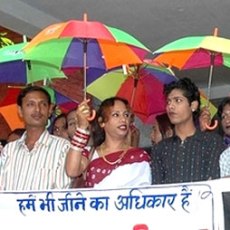 AIDS activists across the world were startled when former South African President Thabo Mbeki decided to publicly rethink the link between the AIDS disease and the HIV virus—reiterating his doubts at a global conference in 2000 on the disease, no less.
AIDS activists across the world were startled when former South African President Thabo Mbeki decided to publicly rethink the link between the AIDS disease and the HIV virus—reiterating his doubts at a global conference in 2000 on the disease, no less.
Hundreds of people walked out of that conference, and later, a study said that the uncertainty created around what causes the disease led to policies that may have increased the AIDS death toll substantially in South Africa.
Now India’s health minister—ostensibly the top man in the fight against the disease—has pulled an Mbeki. At an AIDS gathering on Monday, India’s health minister, Ghulam Nabi Azad described sex between men as “unnatural” and “a disease,” horrifying health activists who have been working for years to reduce the stigma around homosexual relations so as to be able to improve awareness of HIV prevention.
“Unfortunately, this disease, where a man has sex with a man, which is absolutely unnatural and shouldn’t happen but it is happening, is spreading around the world and has also come to India,” said Mr. Azad, speaking in Hindi. “Even in our country the numbers of men having sex with men is significant.”
Mr. Azad went to say that these men are hard to locate, and that is a problem for the fight against AIDS. That’s what Naz Foundation, which works on AIDS outreach has been saying too—and it doesn’t think the health minister’s remarks will help.
The foundation has said that men were often reluctant to acknowledge they were engaging in behavior that put them at risk for the disease, because of the stigma around same-sex relations, making it difficult to provide counseling about HIV prevention and treatment. As part of its efforts to reduce that stigma, the foundation filed a lawsuit to decriminalize same-sex relations, which were illegal in India due to a British-era provision in India’s criminal code known as Section 377. On July 2, 2009, in a landmark judgment, the Delhi High Court overturned that provision. The Supreme Court is yet to hear an appeal against that judgment, but gay rights activists hope the top court will ratify the legality of homosexuality when it does, paving the way to greater acceptance.
Anjali Gopalan, director of Naz Foundation, said on Tuesday that the minister’s remarks were irresponsible.
“It is ridiculous that the health minister of a country would make a comment like that,” she said. “It shows he has no understanding of the issues, which is a shame.”
She also suggested that Mr. Azad may have been tailoring his message to a particular audience. It is fairly common for Indian politicians to say different things in different venues, depending on whether they perceive themselves to be at a regional, national or global gathering. Mr. Azad was speaking in New Delhi to a gathering of district council leaders from around the country. Ms. Gopalan said it was possible that the minister “was saying things he imagines his constituency wants to hear.”
She called for him to withdraw his comments, which were a sharp reminder that for many people in India, homosexuality is still unacceptable.
“We still have a lot do to fight the stigma that exists against gay people in India,” said Ms. Gopalan. “The battle is going to be an ongoing one and for a very long time.”
A spokeswoman for the health ministry said she was in a meeting and hung up upon being told the caller was from the Wall Street Journal.
